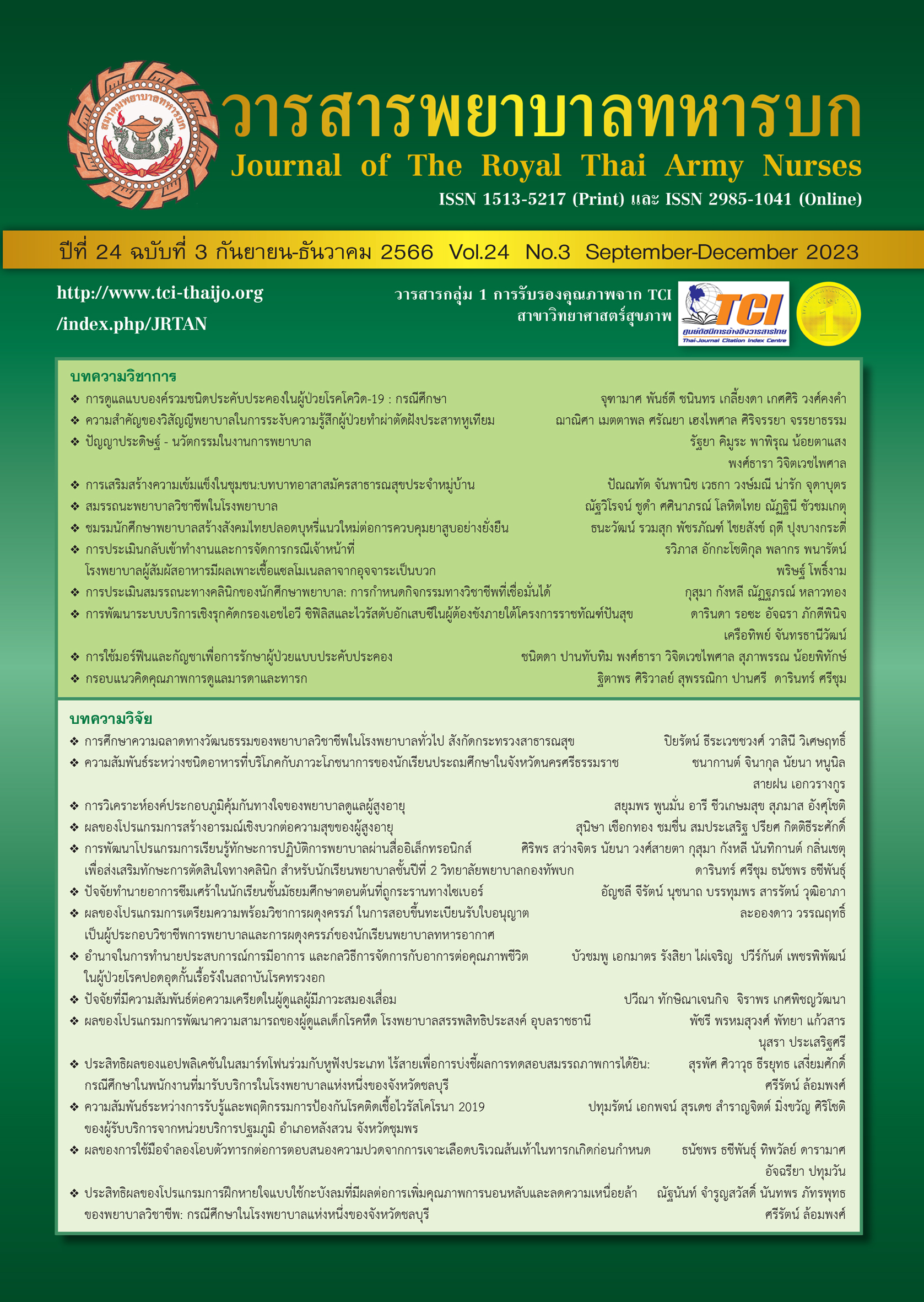Effectiveness of Diaphragmatic Breathing Exercise Program Resulting in Improved Quality of Sleep and Reduced Fatigue among Registered Nurses: Case study in a Hospital, Chonburi Province
Keywords:
Diaphragmatic breathing exercise, Quality of sleep, FatigueAbstract
This quasi-experimental research aimed to assess the effectiveness of diaphragmatic breathing exercise in improving quality of sleep and reducing fatigue among registered nurses in a hospital, Chonburi province. Thirty-three samples were selected by stratified sampling technique with inclusion criteria of those who have been working at emergency and medicine unit. The intervention include training and coaching individually, video, leaflet about the program and LINE group for monitoring their practices. The online questionnaires; including personal information, The Pittsburgh Sleep Quality Index (PSQI)-Thai version, and 10 item Fatigue Assessment Scale (FAS)-Thai version, were employed among the samples between February and March 2023. All data were analyzed by using descriptive statistics, and paired t-test was used to compare a quality of sleep and fatigue after implementation. The level of significant is at p < .05.
Majority of respondents were females (90.9%) with average of age 34.12 years. All of them had a poor quality of sleep (100%) with mean score 8.64. Seventy-three percent had a general level of fatigue with mean score 23.58. After 2 and 4 weeks of participation, they were significantly improved quality of sleep and reduced fatigue (p <.001). This study indicated the effectiveness of diaphragmatic breathing exercise in increasing quality of sleep and reducing fatigue.
Downloads
References
Anothai P, Thanyarat H, Timporn T, Muthita M, Kanokpan B, Panumas U, Atitayaporn S, Factors affecting sleep quality of students in the faculty of public and environmental healthofHuachiewChalermprakietUniversity. Huachiew Chalermprakiet University Journal ofHealthScience.2022;26(1):108-16.(inThai)
Perlis ML, Smith MT, Pigeon WR. Etiology and Pathophysiology of Insomnia. In Principles and Practice of Sleep Medicine. Elsevier Incorporated. 2005.
Sofi F, Cesari F, Casini A, Macchi C, Abbate R, Gensini GF. Insomnia and risk of cardiovascular disease: a meta-analysis. European Journal of Preventive Cardiology 2014; 21(1) : 57-64.
Hertenstein E, Feige B, Gmeiner T, Kienzler C, Spiegelhalder K, Johann A, Jansson-Fröjmark M, Palagini L, Rücker G, Riemann D, Baglioni C. Insomnia as a predictor of mental disorders: A systematic review and meta-analysis. Sleep Medical Reviews. 2019; 43(1) : 96-105.
Kessler RC, Berglund PA, Coulouvrat C, Hajak G, Roth T, Shahly V, Shillington AC, Stephenson JJ, Walsh JK. Insomnia and the performance of US workers: results from the America insomniasurvey.SleepResearchSociety.2011; 34(9) : 1161-71.
Dahlgren A, Tucker P, Gustavsson P, Rudman A. Quick returns and night work as predictors of sleepquality,fatigue,work-familybalanceand satisfaction with work hours. Chronobiology International. 2016; 33(6) : 759-67.
Billones R, Liwang JK, Butler K, Graves L, Saligan LN. Dissecting the fatigue experience: A scoping review of fatigue definitions, dimensions, and measures in non-oncologic medical conditions. Brain Behavior, and Immunity Health. 2021.
Liu Y, Wu LM, Chou PL, Chen MH, Yang LC, Hsu HT. The Influence of Work-Related Fatigue, Work Conditions, and Personal Characteristics on Intent to Leave Among New Nurses. Journal of Nursing Scholarship. 2016; 48(1) : 66-73.
Tawanchai J, Waran T. A problem of sleeping in nurse, Songklanagarind hospital. The Journal of The Psychiatric Association of Thailand. 1997; 42(3) : 123-32. (in Thai)
Petsunee T, Krisada S, Tuangtip T, Viroj T. Health Problems and Health Care Behaviors Among Registered Nurses in Thailand. Journal of Health Systems Research. 2015; 9(1) : 49-60. (in Thai)
Tsai HJ, Kuo TB, Lee GS, Yang CC. Efficacy of paced breathing for insomnia: enhances vagal activity and improves sleep quality. Society for Psychophysiological Research 2015; 52(3) : 388-96.
Yu X, Fumoto M, Nakatani Y, Sekiyama T, Kikuchi H, Seki Y, Sato-Suzuki I, Arita H. Activation of the anterior prefrontal cortex and serotonergic system is associated with improvements in mood and EEG changes induced by Zen meditation practice in novices. International Journal of Psychophysiology. 2011; 80(2) : 103-11.
Liu Y, Jiang TT, Shi TY, Liu YN, Liu XM, Xu GJ, Li FL, Wang YL, Wu XY. The effectiveness of diaphragmatic breathing relaxation training for improving sleep quality among nursing staff during the COVID-19 outbreak: a before and after study. Sleep Medical Reviews. 2021; 78(1) : 8-14.
Sitasuwan T, Bussaratid S, Ruttanaumpawan P, Chotinaiwattarakul W. Reliability and validity of the Thai version of the Pittsburgh Sleep Quality Index. Journal of the Medical Association of Thailand. 2014 ; 97(3) : 57-67.
Michielsen HJ, de Vries J, van Heck GL, van de Vijver FJR, Sijtsma K. Examination of the dimensionality of fatigue: The construction of the Fatigue Assessment Scale (FAS). European Journal of Psychological Assessment. 2004; 20(1) : 39-48.
Cohen, J. A power primer. Psychological Bulletin. 1992 ; 112(1) : 155–9.
Chaiard J, Deeluea J, Suksatit B, Songkham W, Inta N. Short sleep duration among Thai nurses: Influences on fatigue, daytime sleepiness, and occupational errors. Journal of Occupational Health. 2018; 60(5) : 348-55.
Downloads
Published
How to Cite
Issue
Section
License
Copyright (c) 2023 Journal of The Royal Thai Army Nurses

This work is licensed under a Creative Commons Attribution-NonCommercial-NoDerivatives 4.0 International License.
บทความหรือข้อคิดเห็นใดใดที่ปรากฏในวารสารพยาบาลทหารบกเป็นวรรณกรรมของผู้เขียน ซึ่งบรรณาธิการหรือสมาคมพยาบาลทหารบก ไม่จำเป็นต้องเห็นด้วย
บทความที่ได้รับการตีพิมพ์เป็นลิขสิทธิ์ของวารสารพยาบาลทหารบก
The ideas and opinions expressed in the Journal of The Royal Thai Army Nurses are those of the authors and not necessarily those
of the editor or Royal Thai Army Nurses Association.






